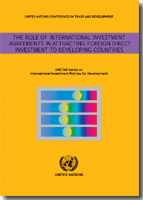Yellow Series: Investor–State Disputes: Prevention and Alternatives to Arbitration
The possibility of recourse to international arbitration has long been seen as an optimal way to provide for protection of foreign investment in international investment agreements (IIAs) and to resolve disputes between foreign investors and States. However, the increasing number of investor-State disputes, with some touching upon important public interest concerns, such as social, health or environmental issues, shed light on certain disadvantages, that that could potentially reduce the benefits that IIAs can bring to developing economies.
Amongst others, concerns relate to the special nature of international investment arbitration, involving a sovereign as a defendant; the potential that investor-State disputes strain the relationship between the investor and the host country; the focus on payment of compensation instead of maintaining a working relationship; the increasingly huge financial amounts at stake; an increase in the time frame for claims to be settled; fears about frivolous and vexatious claims, and general concerns about the legitimacy of the system of investment arbitration as it affects measures of a sovereign State.
Against this background the study seeks to explore alternatives to investment treaty arbitration. A key differentiation is made between two types of such alternative approaches or alternative means:
- Methods of alternative dispute resolution (ADR) that seek to resolve existing disputes through negotiation or amicable settlement such as international conciliation or mediation.
- Dispute prevention policies (DPPs) that attempt to prevent conflicts between foreign investors and States from emerging and escalating into formal investment disputes, for example by establishing inter-institutional alert mechanisms within States or encouraging information sharing among government entities.
The advantages of these alternative approaches are the flexibility they offer, including the possibility to find amicable grounds for settlement between foreign investors and States, permitting the parties to continue a working relationship. The settlement process is also faster and less costly. Finally, certain alternative approaches can improve good governance and other regulatory practices of States.
Nevertheless, there are also challenges when relying on alternative approaches. Amongst others, such alternatives are generally non-binding on the parties and could also be considered as a waste of time and funds if they are not conducted successfully.
This publication served as the background document to the Washington and Lee University and UNCTAD Joint Symposium on International Investment and ADR, held in Lexington, Virginia, USA on 29 March 2010.
















